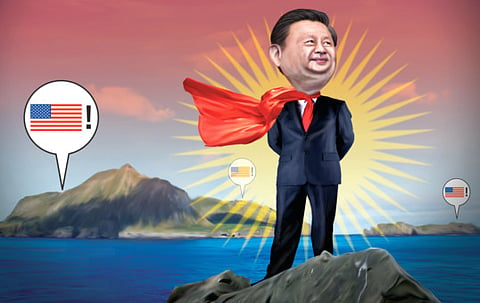China has to learn how to be a great power
The US cannot hold on to a primacy that has already been lost, but nor can Beijing claim its own hegemony

When a United States warship steamed though the South China Sea the other day, China protested and her neighbours applauded. Washington said it was upholding freedom of navigation in the face of Chinese land reclamation projects that are turning disputed rocks into artificial islands. Beijing warned against provocation from an outsider with no claims of its own in the region. The rest of us were reminded of the dismal determinism of Thucydides’s account of the Peloponnesian war.
The demonstration of US naval power — the ship sailed in waters deemed territorial by China — pointed out the multiple collisions of competing historical claims, geography and shifting power balances fuelling an East Asian arms race. Some say there are now as many submarines prowling the waters of the western Pacific as there once were in the north Atlantic. Vietnam, the Philippines, Taiwan and Malaysia also contest the nine-dash line that asserts Chinese suzerainty over the South China Sea. Tokyo and Beijing are locked in a separate dispute in the East China Sea.
Just before the guided missile destroyer USS Lassen set its course, I joined the serried senior ranks of the People’s Liberation Army (PLA) at China’s annual international security conference in Beijing. I have never seen so many starred epaulettes.
The Xiangshan Forum, hosted by the Chinese Association for Military Science, is another sign of the changing times. Not so long ago, the PLA was, in the minds of westerners, an ineffably secret, some would have said sinister, organisation. The Xiangshan meeting, a competitor of sorts to Singapore’s long-running Shangri La Dialogue, speaks to a military establishment that now wants to be heard on the international stage.
China’s rise has come faster than its own leadership had imagined, in part because of the immense damage inflicted on the West by the 2008 financial crash. Beijing now has to learn what it means to be a great power. This is not meant to sound patronising. Rather, it is a description of reality. After two centuries — first as a victim of and then largely a bystander at global events — China has emerged in the space of a couple of decades as second only to America.
This is not as easy as it sounds, especially since pretty much everyone else in the neighbourhood would have preferred things to have remained as they were. China is discovering that, like its neighbours, it too must adjust to China’s rise. I caught a small glimpse of this in the Xiangshan discussions. The PLA was founded as a land force to defend Chinese territory against external aggression. Now the generals are slashing troop numbers as they look to build expeditionary reach with naval and air power. This is what rising powers do. Yet, I have the impression they are puzzling about how to make the transition.
Likewise, the nation’s civilian policymakers often struggle to find the balance between assertion of what they see as China’s rightful claims and recognition that rising powers need to reassure. To western ears, there is a dissonance between loud proclamations of inalienable sovereignty over disputed territory and quiet assurances, heard many times at the forum, that Beijing will never use military force in order to prevail.
What marks out Chinese President Xi Jinping from his predecessors is his determination at once to concentrate his personal authority at home — the old collective leadership has been dismantled — and project power abroad. The land reclamation works in the South China Sea are one manifestation of the latter aim. To my mind, the One Belt, One Road strategy to build Chinese influence across Eurasia is a still more ambitious one.
Xi’s decision to hold talks with Taiwan’s outgoing President Ma Ying-jeou — the first such meeting since Taiwan broke from the mainland in 1949 — also suggests a leader willing to take risks. The meeting may be seen to have badly backfired if Ma’s KTM loses to the more overtly nationalistic Democrat Progressives in January’s elections.
Beijing has a point when it says that things cannot stay the same. Its strongest argument is also the simplest: The world has changed. The range and complexity of China’s economic and security interests have multiplied. Like other great powers, it must assume a role in policing the global commons. To say that the old balance must not be disturbed is to defy the facts of geopolitics. You cannot look at the 21st century through the eyes of the 20th. Oh, and when last did a rising power not seek control over its coastal waters?
Yet, it is equally natural that Beijing’s ambitions jar with the US. America’s presence in East Asia has been the guarantor of regional peace. What is more, the US is an East Asian power by invitation. China’s neighbouring states have been asking for a bigger, not a smaller, US presence. Vietnam is cross because Washington will not sell it sufficiently sophisticated weaponry. Think about it. The big criticism from most regional powers of US President Barack Obama’s pivot to Asia is that it has been too timid.
East Asia will not stay the same for the simple reason that China’s rise has remade the landscape. America cannot hold on to a primacy that has already been lost. But nor can China claim its own hegemony. A new order must accommodate both. Any effort from either side to prove otherwise would tell us only that, like Sparta and Athens, they are doomed to collide.
— Financial Times



